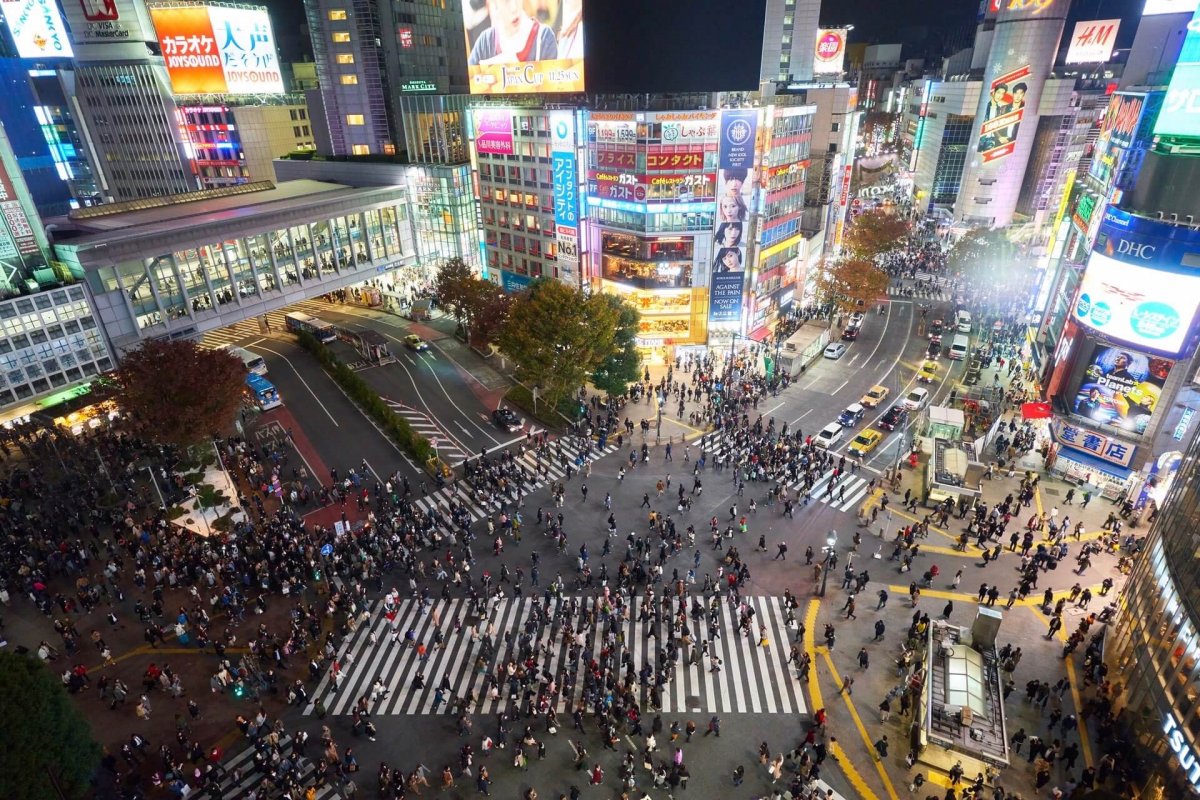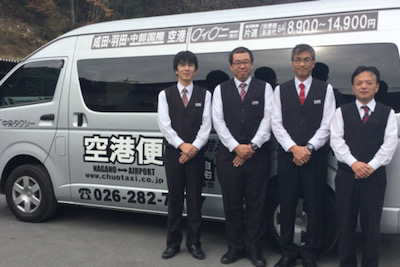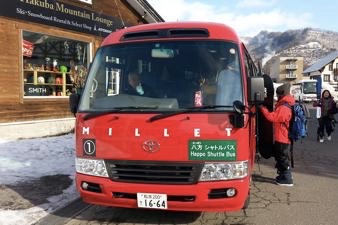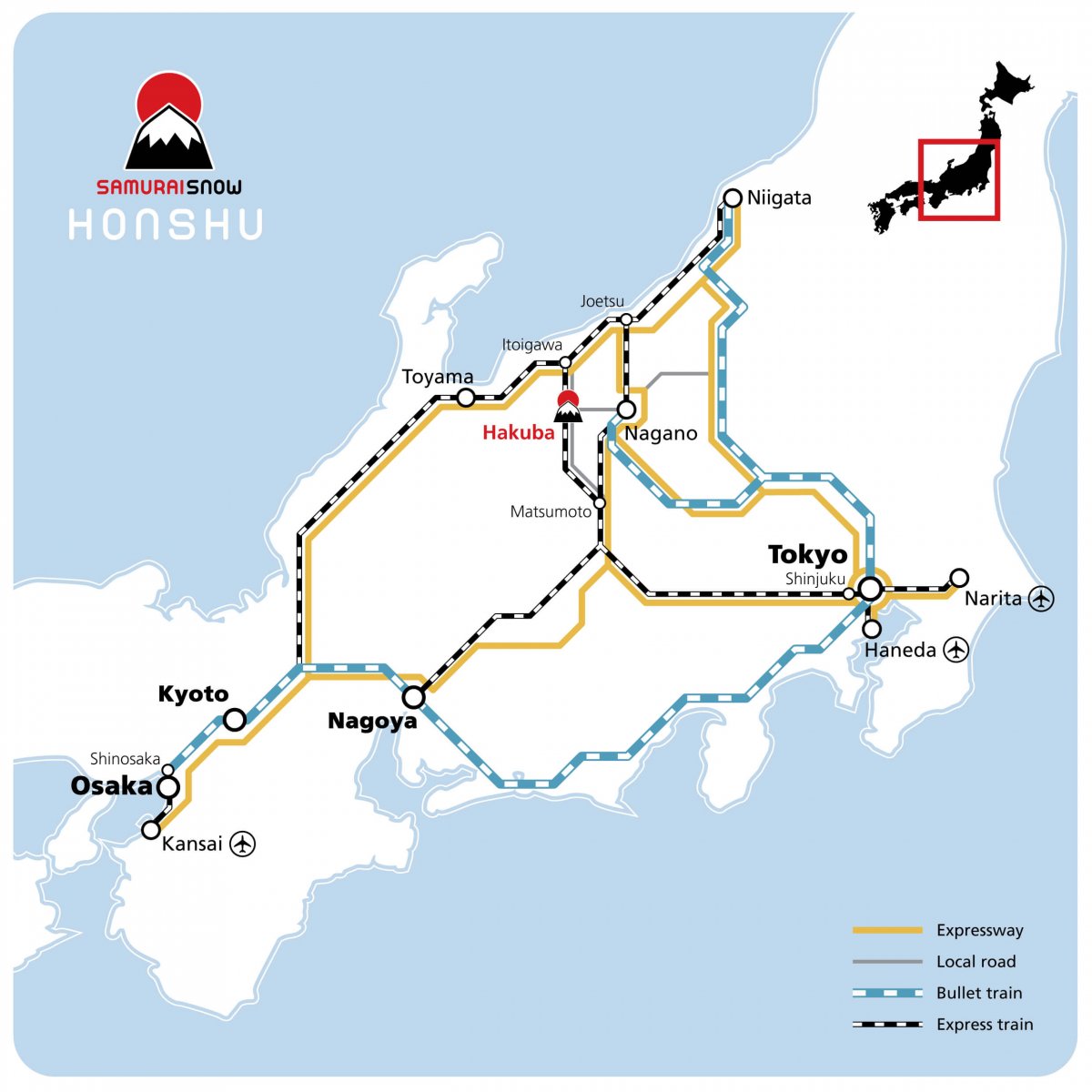
Overview
Tokyo Narita Airport is one of two international airports serving the Greater Tokyo Area, the other one being Haneda Airport, which together forms the main gateway in and out of Japan.
Located 60 kilometers east of central Tokyo, Narita Airport was built to meet the increasing demands of flight traffic placed on Haneda Airport, which did not have enough physical space to expand.
Narita is a larger airport than Haneda and is located further away from the center of the city but is well connected to the city via rapid train services.
The transfer time to Hakuba is between 4 and 7 hours depending on your choice of transfer.
Train, bus, taxi and self drive are both possible options for transport from Tokyo Narita Airport to Hakuba.
Getting Around Tokyo
Getting around Tokyo by rail is usually the quickest and best-priced option regardless of where you are staying in the city.
Taxis in Japan are usually significantly more expensive than taking the train.
The majority of the Tokyo transit system is made up of 2x rail networks - the overground state-run Japan Rail (JR) system and the underground metro system.
Taking them together, these networks are one of the most extensive urban rail networks in the world. There is nothing you would want to see in Tokyo that you can't get to by using these rail networks.
In addition, there are a number of privately owned rail lines that have their own lines and stations. These can be useful to take for certain routes but are almost never the only transit option and are not covered by the JR Rail Pass.
Looking at the maps, the system can be pretty intimidating at first glance but the system is very well run and the staff at stations are super helpful.
Tokyo JR Rail Map
Tokyo Metro Map


Train from Tokyo Narita Airport to Nagano & Taxi or Bus to Hakuba
- Price: ¥14,000 to ¥38,500 per person depending on the number of passengers and choice of transfer from Nagano to Hakuba
- Transfer Time: 4hr15 to 5 hours depending on the choice of transfer from Nagano to Hakuba
Japan has a world-class network of trains that famously run on time to the second!
There are two main rail options for getting from Tokyo Narita Airport into Tokyo:
- Skyliner - a Keisei Private Rail Train
- Narita Express (NEX) - part of the JR Rail Network
The Skyliner is the faster option but is not part of the JR Rail Network and so the JR Rail Pass is not valid on this service.
Tickets can be purchased on the day of travel from ticket machines or a sales counter.
The route from Tokyo Narita Airport to Nagano differs, depending on whether you prefer to start with the Skyliner or the Narita Express:
Option 1: Skyliner + Shinkansen
The route takes place in three stages:
- Stage 1: Keisei Skyliner: Narita Airport Terminal Station -> Nippori Station (37 minutes)
- Stage 2: JR Yamanote Line: Nippori Station -> Ueno Station (4 minutes)
- Stage 3: Shinkansen Hakutaka: Ueno Station -> Nagano Station (88 minutes)
Option 2: Narita Express + Shinkansen
The route takes place in two stages:
- Stage 1: Narita Express: Narita Airport Terminal Station -> Tokyo Station (65 minutes)
- Stage 2: Shinkansen Hakutaka: Tokyo Station -> Nagano Station (93 minutes)
Nagano is the gateway city for passengers heading to the ski resorts known as the 'Japan Alps'.
Bus, private taxi transfer, train and self-drive are all possible options for transport from Nagano to Hakuba.
Japan Rail Pass: For guests visiting Hakuba as part of a longer itinerary of travel elsewhere in Japan, either side of their ski experience, a Japan Rail Pass can be a fantastic investment, allowing unlimited train travel on most Japan Rail (JR) trains, for periods of 7, 14 or 21 days to suit your travel schedule.
- Look up winter season train timetables on JR East for Narita Express & JR Trains and Keisei for Skyliner OR Search Japan's train schedules using the Japan Transit Planner.
Pros
- Fastest transfer option
- Free Shinkansen if you hold a JR Rail Pass
Cons
- Two or three changes required
- Not ideal for passengers with ski / snowboard bags
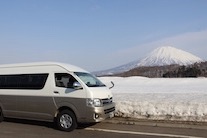
Narita Airport to Hakuba Taxi
- Price: ¥17,500 to ¥71,000 per person - depending on the number of passengers
- Transfer Time: 4.5 to 5.5 hours - depending on traffic & driving conditions
Private Jumbo 7-Seater Taxi Transfers are the most convenient and fastest option for transfer from Tokyo Narita Airport to Hakuba.
On arrival at the airport, the driver will meet you in the arrival lobby, carry your bags to the vehicle and drop you off at your check in location in Hakuba.
On departure, the driver will collect you from your accommodation and drop you off at the correct location for check-in for your flight. This means minimal pushing of trollies stacked with ski bags!
Private taxi vehicle transfers must be booked in advance.
Tip
- You can book a stop-off at a supermarket to buy groceries for an additional charge. If you are staying in self-catering accommodation in Hakuba and plan to cook some of your own meals, this can be really useful
Pros
- Available 24 hours a day
- Most convenient
- Faster than bus services
Cons
- More expensive than other options
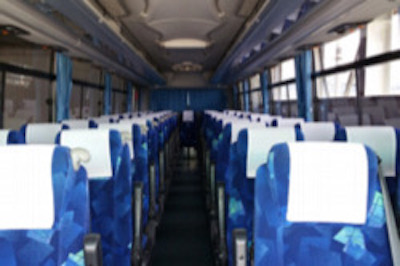
Narita Airport to Hakuba Bus
- Price: ¥9,600 to ¥10,600 per person
- Transfer Time: 5.5 to 6 hours
Nagano Snow Shuttle operates a ski bus service with multiple daily departures from Tokyo Narita Airport to Hakuba.
The afternoon and evening bus transfers from Narita Airport to Hakuba include a drop-off service at your accommodation.
The morning bus transfer from Narita Airport to Hakuba drops off at the Base Camp Bus Terminal in the Echoland area.
For bus transfers from Hakuba to Narita Airport, there is no pick-up service provided but the bus does pick up from stops in each village across the Hakuba Valley.
If you let your accommodation provider know in advance, most will meet you at Base Camp and take you to your accommodation for check-in.
Similarly for departure, if you let your accommodation provider know which bus you have booked with sufficient notice, most will pick you up from your accommodation and drop you off at the bus pick-up location in plenty of time.
Reservation in advance for seats on all of these services is required.
Pros
- Well priced
- Drop off at accommodation is provided for some departures
- Some transfers are direct with no change of vehicle required
Cons
- Slower than the Train to Nagano & road transfer option
- Some departures are not a door-to-door service
- Some transfers require a change of vehicle at Nagano

Train from Narita Airport to Hakuba
- Price: ¥8,000 to ¥15,000 per person
- Transfer Time: Up to 7 hours (including waiting time between trains)
When coming from Tokyo Narita Airport and wanting to stick to trains only, the fastest routes are not via Nagano.
There are two main rail options for the first stage of getting from Tokyo Narita Airport into Tokyo:
- Skyliner - a Keisei Private Rail Train
- Narita Express (NEX) - part of the JR Rail Network
The Skyliner is the faster option but is not part of the JR Rail Network and so the JR Rail Pass is not valid on this service.
Tickets can be purchased on the day of travel from ticket machines or a sales counter.
The route from Tokyo Narita Airport to Hakuba differs slightly, depending on whether you prefer to start with the Skyliner or the Narita Express:
Option 1: Skyliner + Shinkansen
The route takes place in five stages:
- Stage 1: Keisei Skyliner: Narita Airport Terminal Station -> Nippori Station (37 minutes)
- Stage 2: JR Yamanote Line: Nippori Station -> Ueno Station (4 minutes)
- Stage 3: Shinkansen Hakutaka: Ueno Station -> Itoigawa Station (2 hours)
- Stage 4: JR Oita Line: Itoigawa Station -> Minami-Otari Station (1 hour)
- Stage 5: JR Oita Line: Minami-Otari Station -> Hakuba Station (20 minutes)
Option 2: Narita Express + Shinkansen
The route takes place in four stages:
- Stage 1: Narita Express: Narita Airport Terminal Station -> Tokyo Station (65 minutes)
- Stage 2: Shinkansen Hakutaka: Tokyo Station -> Itoigawa Station (2hrs10)
- Stage 3: JR Oita Line: Itoigawa Station -> Minami-Otari Station (1 hour)
- Stage 4: JR Oita Line: Minami-Otari Station -> Hakuba Station (20 minutes)
What is the closest Train Station in Hakuba?
The closest station to your accommodation depends on where you are staying in the Hakuba Valley:
- Kamishiro Station for Goryu village
- Hakuba Station for Echoland area, Happo One village or Wadano village
- Shinano-Moriue Station for Iwatake village
- Hakuba Oike Station for Tsugaike village
- Chikuni Station for Norikura
- Minami Otari Station for Cortina
Hakuba Transport Map
If you plan which train you plan to get in advance, most accommodations in Hakuba will provide a pick up and drop service to / from your accommodation, if you book it with them in advance with a couple of weeks’ notice.
Alternatively, you can take a local taxi from Hakuba Station. Please ensure you have your destination written out in Japanese as most taxi drivers in Japan do not speak conversational level English.
Japan Rail Pass: For guests visiting Hakuba as part of a longer itinerary of travel elsewhere in Japan, either side of their ski experience, a Japan Rail Pass can be a fantastic investment, allowing unlimited train travel on most Japan Rail trains, for periods of 7, 14 or 21 days to suit your travel schedule.
- Look up winter season train timetables on JR East for Narita Express & JR Trains and Keisei for Skyliner OR Search Japan's train schedules using the Japan Transit Planner.
Pros
- Free if you hold a JR Rail Pass
Cons
- A little complex if not familiar with trains in Japan
- Not ideal for passengers with ski / snowboard bags
- Longer total transfer time than going via Nagano

Driving from Narita Airport to Hakuba
- Price: Varies by vehicle type and hire duration
- Transfer Time: 4.5 to 5.5 hours
Tokyo Narita Airport has lots of car hire options for those wanting to drive from Tokyo Narita Airport to Hakuba.
The route is long but relatively straightforward with road signs in English and an excellent road network.
Driving in January and February in the Nagano region can be a little tricky for those without experience of driving in challenging winter conditions. Snow & ice covered roads are possible and visibility can be poor when snow is falling.
If you are comfortable driving in these conditions, having a vehicle opens up the possibility of exploring all of the ski resorts that the Hakuba Valley has to offer or venturing to off-the-beaten-path Onsen hot springs in the area.
If you like the sound of this but prefer not to drive on your arrival and departure days, you can hire a car in Hakuba. This is becoming increasingly popular, so book as early as you can.
Larger 7 or 8-seater vehicles, such as Toyota Hi-Ace or Mistubishi Delica, are available to book in advance and can easily transport ski and snowboard bags.
Hire vehicles are four-wheel drive, come with winter tyres fitted (so no snow chains required) and English language GPS can be booked.
All drivers must bring their own national driver's license and a valid International Drivers Permit to legally drive in Japan. Car hire companies will not hand over the keys without these documents.
Pros
- Flexibility to ski wherever you like in the Hakuba Valley and visit Hakuba's different villages
Cons
- Can be challenging driving conditions in the Nagano region – snowy / icy roads & poor visibility are possible
You might also like
Hakuba Transfers
Whether you are coming from Tokyo or one of the other Ski Resorts in the Nagano area, there are numerous options for the transfer to Hakuba.
Book now through our Pre-Trip Concierge Service
Available for guests that have booked accommodation with us.
Getting Around Hakuba
Whether you prefer to jump on a shuttle bus, book a taxi or hire a car and drive yourself, there are plenty of options to get around the Hakuba Valley.
Hakuba Accommodation
The Hakuba Valley is spread out and offers a wide range of accommodation options from luxury 5-star hotels, self contained apartments and houses to pensions, lodges and cabins.
All information is correct to the best of our knowledge at the time of writing

